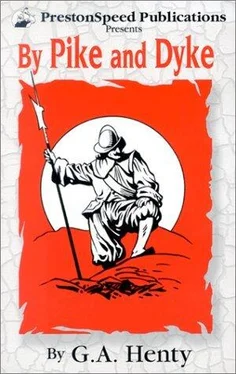G.A. Henty - By Pike and Dyke - A Tale of the Rise of the Dutch Republic
Здесь есть возможность читать онлайн «G.A. Henty - By Pike and Dyke - A Tale of the Rise of the Dutch Republic» весь текст электронной книги совершенно бесплатно (целиком полную версию без сокращений). В некоторых случаях можно слушать аудио, скачать через торрент в формате fb2 и присутствует краткое содержание. Жанр: Старинная литература, на английском языке. Описание произведения, (предисловие) а так же отзывы посетителей доступны на портале библиотеки ЛибКат.
- Название:By Pike and Dyke: A Tale of the Rise of the Dutch Republic
- Автор:
- Жанр:
- Год:неизвестен
- ISBN:нет данных
- Рейтинг книги:5 / 5. Голосов: 1
-
Избранное:Добавить в избранное
- Отзывы:
-
Ваша оценка:
- 100
- 1
- 2
- 3
- 4
- 5
By Pike and Dyke: A Tale of the Rise of the Dutch Republic: краткое содержание, описание и аннотация
Предлагаем к чтению аннотацию, описание, краткое содержание или предисловие (зависит от того, что написал сам автор книги «By Pike and Dyke: A Tale of the Rise of the Dutch Republic»). Если вы не нашли необходимую информацию о книге — напишите в комментариях, мы постараемся отыскать её.
By Pike and Dyke: A Tale of the Rise of the Dutch Republic — читать онлайн бесплатно полную книгу (весь текст) целиком
Ниже представлен текст книги, разбитый по страницам. Система сохранения места последней прочитанной страницы, позволяет с удобством читать онлайн бесплатно книгу «By Pike and Dyke: A Tale of the Rise of the Dutch Republic», без необходимости каждый раз заново искать на чём Вы остановились. Поставьте закладку, и сможете в любой момент перейти на страницу, на которой закончили чтение.
Интервал:
Закладка:
During the year 1575 the only military operation of importance was the recovery by the Spaniards of the Island of Schouwen, which, with its chief town Zierickzee, was recovered by a most daring feat of arms — the Spaniards wading for miles through water up to the neck on a wild and stormy night, and making their way across in spite of the efforts of the Zeelanders in their ships. Zierickzee indeed resisted for many months, and finally surrendered only to hunger; the garrison obtaining good terms from the Spaniards, who were so anxious for its possession that to obtain it they were even willing for once to forego their vengeance for the long resistance it had offered.
In March, 1576, while the siege was still going on, Requesens died suddenly of a violent fever, brought on partly by anxiety caused by another mutiny of the troops. This mutiny more than counterbalanced the advantage gained by the capture of the Island of Schouwen, for after taking possession of it the soldiers engaged in the service at once joined the mutiny and marched away into Brabant.
The position of Holland had gone from bad to worse, the utmost efforts of the population were needed to repair the broken dykes and again recover the submerged lands. So bare was the country of animals of all kinds, that it had become necessary to pass a law forbidding for a considerable period the slaughter of oxen, cows, calves, sheep, or poultry. Holland and Zeeland had now united in a confederacy, of which the prince was at the head, and by an Act of Union in June, 1575, the two little republics became virtually one. Among the powers and duties granted to the prince he was to maintain the practice of the reformed evangelical religion, and to cause to cease the exercise of all other religions contrary to the Gospel. He was, however, not to permit that inquisition should be made into any man's belief or conscience, or that any man by cause thereof should suffer trouble, injury, or hindrance.
Upon one point only the prince had been peremptory, he would have no persecution. In the original terms he had been requested to suppress “the Catholic religion,” but had altered the words into “religion at variance with the Gospel.” Almost alone, at a time when every one was intolerant, the Prince of Orange was firmly resolved that all men should have liberty of conscience.
Holland suffered a great loss when Admiral Boisot fell in endeavouring to relieve Zierickzee. The harbour had been surrounded by Spaniards by a submerged dyke of piles of rubbish. Against this Boisot drove his ship, which was the largest of his fleet. He did not succeed in breaking through. The tide ebbed and left his ship aground, while the other vessels were beaten back. Rather than fall into the hands of the enemy, he and 300 of his companions sprang overboard and endeavoured to effect their escape by swimming, but darkness came on before he could be picked up, and he perished by drowning.
The mutiny among the Spanish regiments spread rapidly, and the greater part of the German troops of Spain took part in it. The mutineers held the various citadels throughout the country, and ravaged the towns, villages, and open country. The condition of the people of Brabant was worse than ever. Despair led them to turn again to the provinces which had so long resisted the authority of Spain, and the fifteen other states, at the invitation of the prince, sent deputies to Ghent to a general congress, to arrange for a close union between the whole of the provinces of the Netherlands.
Risings took place in all parts of the country, but they were always repressed by the Spaniards; who, though in open mutiny against their king and officers, had no idea of permitting the people of the Netherlands to recover the liberty that had at the cost of so much blood been wrung from them. Maastricht drove out its garrison; but the Spaniards advanced against the town, seized a vast number of women, and placing these before them advanced to the assault. The citizens dared not fire, as many of their own wives or sisters were among the women; the town was therefore taken, and a hideous massacre followed.
Ned Martin had now been two years engaged upon various missions to Holland, and Lord Walsingham himself acknowledged to his mistress that her choice of the young officer had been a singularly good one. He had conducted himself with great discretion, his reports were full and minute, and he had several times had audiences with the queen, and had personally related to her matters of importance concerning the state of Holland, and the views of the prince and the Estates General. The congress at Ghent, and the agitation throughout the whole of the Netherlands, had created a lively interest in England, and Ned received orders to visit Ghent and Antwerp, and to ascertain more surely the probability of an organization of the provinces into a general confederation.
When he reached Ghent he found that the attention of the citizens was for the time chiefly occupied with the siege of the citadel, which was held by a Spanish garrison, and he therefore proceeded to Antwerp. This was at the time probably the wealthiest city in Europe. It carried on the largest commerce in the world, its warehouses were full of the treasures of all countries, its merchants vied with princes in splendour. The proud city was dominated, however, by its citadel, which had been erected not for the purpose of external defence but to overawe the town.
The governor of the garrison, D'Avila, had been all along recognized as one of the leaders of the mutiny. The town itself was garrisoned by Germans who still held aloof from the mutiny, but who had been tampered with by him. The governor of the city, Champagny, although a sincere Catholic, hated the Spaniards, and had entered into negotiations with the prince. The citizens thought at present but little of the common cause, their thoughts being absorbed by fears of their own safety, threatened by the mutinous Spanish troops who had already captured and sacked Alost, and were now assembling with the evident intention of gathering for themselves the rich booty contained within the walls of Antwerp.
As they approached the town, a force of 5000 Walloon infantry and 1200 cavalry were despatched from Brussels to the aid of its sister city. No sooner, however, did this force enter the town than it broke into a mutiny, which was only repressed with the greatest difficulty by Champagny. It was at this moment that Ned entered the city. He at once communicated with the governor, and delivered to him some messages with which he had been charged by the Prince of Orange, whom he had visited on his way.
“Had you arrived three days since I could have discussed these matters with you,” the governor said; “but as it is we are hourly expecting attack, and can think of nothing but preparations for defence. I shall be glad if you can assist me in that direction. Half the German garrison are traitors, the Walloons who have just entered are in no way to be relied upon, and it is the burghers themselves upon whom the defence of the town must really fall. They are now engaged in raising a rampart facing the citadel. I am at once proceeding thither to superintend the work.”
Ned accompanied the governor to the spot and found twelve thousand men and women labouring earnestly to erect a rampart, constructed of bales of goods, casks of earth, upturned wagons, and other bulky objects. The guns of the fortress opened upon the workers, and so impeded them that night fell before the fortifications were nearly completed. Unfortunately it was bright moonlight, and the artillerymen continued their fire with such accuracy that the work was at last abandoned, and the citizens retired to their homes. Champagny did all that was possible. Aided by some burghers and his own servants, he planted what few cannon there were at the weakest points; but his general directions were all neglected, and not even scouts were posted.
Читать дальшеИнтервал:
Закладка:
Похожие книги на «By Pike and Dyke: A Tale of the Rise of the Dutch Republic»
Представляем Вашему вниманию похожие книги на «By Pike and Dyke: A Tale of the Rise of the Dutch Republic» списком для выбора. Мы отобрали схожую по названию и смыслу литературу в надежде предоставить читателям больше вариантов отыскать новые, интересные, ещё непрочитанные произведения.
Обсуждение, отзывы о книге «By Pike and Dyke: A Tale of the Rise of the Dutch Republic» и просто собственные мнения читателей. Оставьте ваши комментарии, напишите, что Вы думаете о произведении, его смысле или главных героях. Укажите что конкретно понравилось, а что нет, и почему Вы так считаете.












